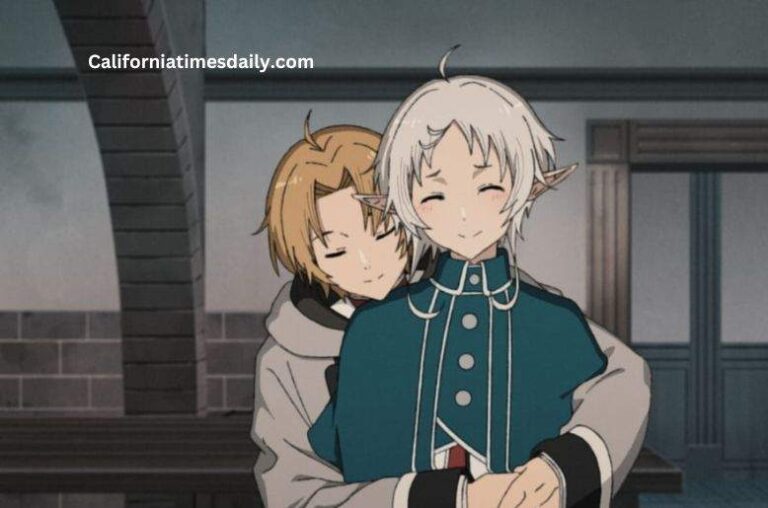In Mushoku Tensei Chapter 98, titled “Farewells,” Rudeus Greyrat and Norn Greyrat are featured. Norn is determined to go to the Begaritt Continent, despite Rudeus pointing out that she cannot go there. Rudeus assures Norn that he will go instead and makes preparations to travel.
Mushoku Tensei: Isekai Ittara Honki Dasu is a Japanese light novel series by Rifujin na Magonote about a jobless and hopeless man who reincarnates in a fantasy world while keeping his memories, determined to live his new life without regrets.
Mushoku Tensei 98 is a part of a light novel series continues to delve into the development of Rudeus’ companions, and chapter 98 places the spotlight on Ghislaine Dedoldia, the fierce swordswoman. This chapter marks a potential turning point in her character growth.
Ghislaine’s Awakening
Previously known for her brute force and disregard for proper swordsmanship, Ghislaine witnesses firsthand the effectiveness of Eris’ more refined technique. This encounter ignites a spark of change within her. Ghislaine acknowledges the limitations of her current fighting style and embarks on a journey of self-improvement.
Recognizing the need for focused training, Ghislaine distances herself from distractions. She no longer spends time with less dedicated disciples, choosing instead to prioritise honing her skills. This newfound determination hints at a deeper ambition within Ghislaine.
Eris as Inspiration
While Ghislaine’s initial motivation might stem from practicality, the chapter subtly suggests a budding rivalry with Eris. Ghislaine acknowledges Eris as a worthy opponent, and this recognition could fuel her dedication to surpassing Eris’ abilities.
The chapter also offers a glimpse into King Kishirisu’s reaction to the news of the Demon Lord’s defeat at Rudeus’ hands. While initially enthusiastic about the victory, his spirit dampens upon learning the Demon Lord was already weakened. This minor detail sheds light on Kishirisu’s personality and priorities.
Dwarf Politics and Racism
Through Rudeus’s backstory, we gain insights into dwarf culture and politics. It is made clear racism against half-elves runs deep. Dwarves value clan and lineage above all. As such, Rudeus’s mixed blood meant he could never be fully accepted.
We also learn of tensions between different dwarf clans that vie for power. Internal conflicts may have contributed to the devastation of Rudeus’s clan during the orc attack. The dwarves are complex people with their own prejudices and fault lines.

Story Forward
Rudeus revealing of his past to Rudy and the others helps develop the characters and world-building. It shows the grey areas in a supposedly simple conflict between dwarves and orcs. Most importantly, it moves the overarching plot forward as Rudeus now agrees to help Rudy on his quest in the Dwarf Kingdom.
Fans look forward to seeing how Rudeus involvement impacts future events, and if Rudy can bring positive change to the closed-off dwarf society through his interactions. The mysteries of the Dwarf Kingdom are deepening with each new revelation.
Frequently Asked Questions
Mushoku Tensei 98 is a popular Japanese light novel series. It tells the story of Rudy, a 34-year-old shut. He is reincarnated into a magical world following his untimely death. There, he vows to live a fulfilling life and overcome the mistakes of his past.
The setting is a high fantasy world with swords and sorcery elements. Various races like humans, elves, dwarves and beastmen co-exist. Different kingdoms control distinct regions. Magic and magical beasts are common. The story explores Rudy’s adventures and growth in this richly detailed setting.
Revealing Rudeus’s tragic past provides important context around dwarf politics and racism. It shows the complexities of conflicts like dwarves vs orcs. Most of all, it develops Rudeus as a character the audience can empathise with. Learning his history motivates him to help Rudy, driving the overarching plot in new directions.
As Rudy and companions delve deeper into dwarf lands and culture, more mysteries are bound to unfold. Internal political intrigue may be exposed. The prejudices Rudeus faced will likely be explored in greater depth. Most excitingly, Rudy’s interactions could help bring positive change to the isolationist dwarven society in meaningful ways. Plenty of surprises likely remain in store.
The author weaves intricate world-building through character-driven storytelling. By learning history and lore through the lens of fully-realised characters like Rudeus, readers become emotionally invested. Reveals feel organic rather than expository. Crafting complex, sympathetic characters like Rudeus who experience discrimination also lends nuance to explored cultures and conflicts.
